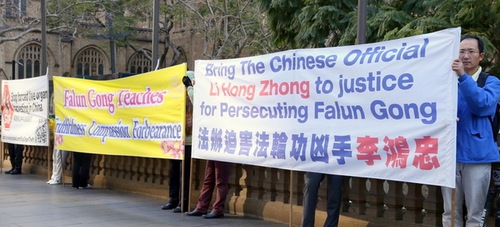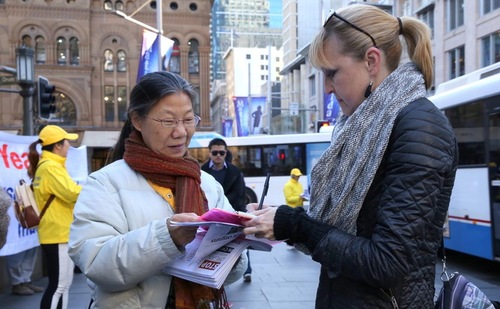Sydney: Hubei Province Party Secretary Met with Protest for Persecuting Falun Gong
(Minghui.org) Former Chinese leader Jiang Zemin banned Falun Gong in July 1999, with many followers subsequently implementing his persecution policy. This has driven the nationwide suppression at different levels during the past 16 years. Li Hongzhong, Hubei Province Party Secretary, is one of such officer. He visited Sydney on August 6, 2015, and was met with a protest.
 Protest by Falun Gong practitioners in front of Sydney Town Hall in response to Li Hongzhong's visit.
Protest by Falun Gong practitioners in front of Sydney Town Hall in response to Li Hongzhong's visit.
Track Record of Human Rights Violations
Li was mayor and Party secretary of Shenzhen City, Guangdong Province between 2004 and 2006, and gave orders to intensify the suppression, wrote Lucy Zhao, coordinator of the Australian Falun Dafa Association, in a letter to Sydney mayor Clover Moore.
One example was when Futian District Court in Shenzhen sentenced 16 practitioners during the first two months of 2004, with terms up to 13 years. At least 150 Shenzhen practitioners were arrested between 2005 and 2007, according to information received by the Minghui website and the World Organization to Investigate the Persecution of Falun Gong (WOIPFG).
When the nationwide campaign was launched in 2004 to defame Falun Gong in the education system, Li ordered all schools to react actively. This included three months of slandering propaganda, brainwashing with defamatory DVDs, and forcing students to sign petitions and present posters attacking Falun Gong.
As early as 2000 and 2001 when Li was Party Secretary of Huizhou City in Guangdong Province, he was already playing a key role in mistreating Falun Gong practitioners. More than 30 practitioners were sent to brainwashing centers and five were sent to forced labor camps. Wang Liyun, arrested for telling others about Falun Gong on October 25, 2000, was arrested, beaten, and tortured. She died one year later at the age of 40.
Involvement in Organ Harvesting
Li visited Sydney because Hubei Province's capital city of Wuhan, was proposed to be a sister city of Sydney.
During the rally in front of the Sydney Town Hall on George Street, Zhao requested that the Sydney city government not invite Li to speak to city officials because of his previous human rights violations.
Li continued to suppress Falun Gong after being appointed as Hubei Province Party secretary in late 2010. In Wuhan City alone, at least 108 practitioners were arrested in 2001, five sent to forced labor camps, and eight sent to prisons. Five died due to being tortured while in police custody.
In both Shenzhen and Hubei, Li played an instrumental role in organ harvesting, wrote Zhao in her letter.
Shenzhen City included heart transplants and liver transplants as part of medical insurance in 2006. It was one of the first cities that issued such a policy. Investigations led by the WOIPFG found that numerous Shenzhen hospitals were involved in organ harvesting.
Li awarded Tongji Hospital of Wuhan in 2014 for breakthroughs in organ transplantation, and this technology was quickly introduced to ten major hospitals in China.
 One passerby signs a petition to support Falun Gong practitioners.
One passerby signs a petition to support Falun Gong practitioners.
10,000 Transplant Procedures Per Year vs. 37 Registrations Nationwide
When Li's white SUV entered the parking lot at Sydney Town Hall, he was confronted with banners by practitioners with words of “Falun Dafa is Good,” and “Bring Chinese Official Li Hongzhong to Justice for Persecuting Falun Gong.” As he left at 11:00 a.m., his vehicle was again met with protesting practitioners.
According to an article on The Sydney Morning Herald on April 8, 2015, “China has the second highest rate of transplants in the world, with startlingly short wait times for transplant recipients of just two to three weeks. But a recent Red Cross report found only 37 people nationwide were registered organ donors and harvesting organs from executed prisoners did not come close to accounting for the more than 10,000 transplant procedures performed every year.”
“There's no other way to explain what's happening,” Human rights lawyer David Matas said in the article, “Somebody's being killed for the organs.”